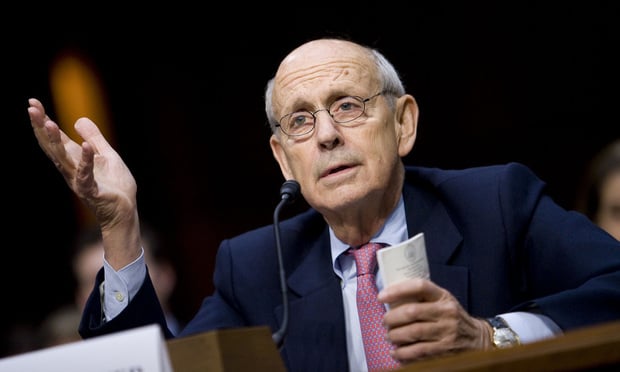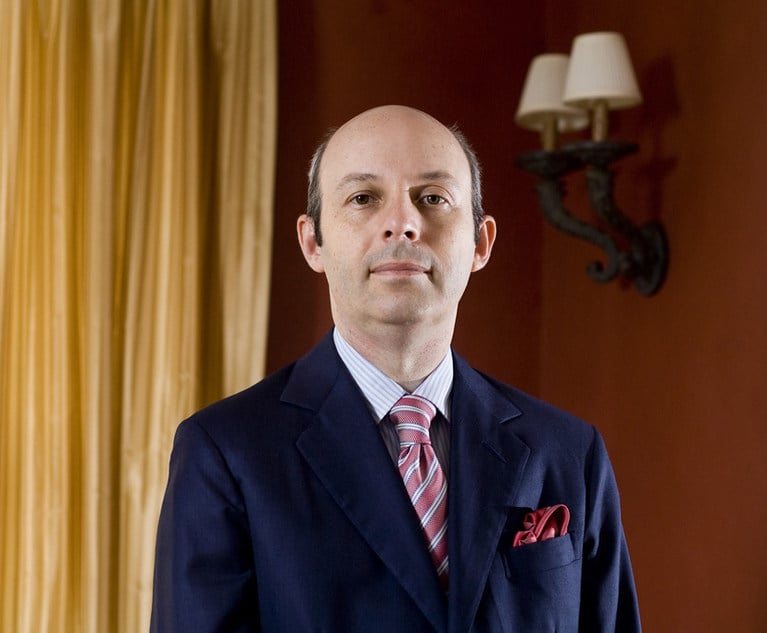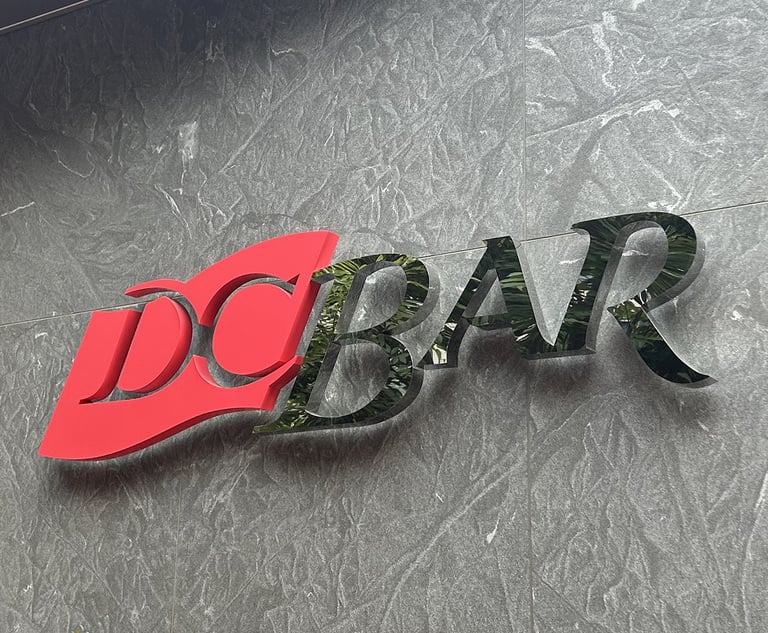Everything Was 'Excellent' In Key Patent Case at Supreme Court
It's rare for the justices to compliment the lawyers before them for the quality of their briefs, but check out the arguments this week in Helsinn Healthcare v. Teva Pharmaceuticals. Will the court write an "excellent" opinion?
December 07, 2018 at 12:53 PM
3 minute read
 Justice Stephen Breyer on Capitol Hill in 2011. Credit: Diego M. Radzinschi/ National Law Journal
Justice Stephen Breyer on Capitol Hill in 2011. Credit: Diego M. Radzinschi/ National Law Journal
Patent disputes are not the easiest cases for non-IP lawyers and the public to get their heads around, and most U.S. Supreme Court justices don't count themselves as IP experts. They are generalists.
So they depend on clear and understandable briefing by the parties. They apparently got all that and more from Goodwin Procter partner William Jay and Kannon Shanmugam of Williams & Connolly in the case Helsinn Healthcare v. Teva Pharmaceuticals.
It is rare for justices to compliment the lawyers before them for the quality of their briefs, but Justice Stephen Breyer did just that during oral argument in the case Dec. 4.
Breyer was exasperated he could not come up with a good analogy that would help him understand the contested wording of the America Invents Act and would clarify what happens when an inventor puts an invention on sale or makes it “otherwise available to the public” before seeking a patent.
The meaning of the word “otherwise” was the main focus of the hour-long argument.
“It's possible among these excellent briefs—I thought the bar really earned its pay on both sides—but, I mean … I couldn't come up with a good English example there. So I thought maybe—maybe you have,” Breyer said to Jay, who argued for Teva Pharmaceuticals Industries Ltd.
Jay began his answer, then paused to say, “Thank you, your honor.”
Justice Elena Kagan soon joined the praise-fest. She asked Jay about “Mr. Shanmugam's excellent brief.” (Here's a link to it.) Jay rose to the occasion, referencing “both of his excellent briefs.”
In his rebuttal, Shanmugam returned the favor, mentioning Jay's “excellent brief.” (You can read it here.) Breyer later chimed in again that “everybody's is excellent.”
All this effusiveness may have been too much for Chief Justice John Roberts Jr., who had the last word as the argument ended: “Thank you, counsel. The case is submitted. I am sure we'll come up with an excellent opinion.”
Here's the transcript in Helsinn Healthcare v. Teva Pharmaceuticals:
Read more:
Supreme Court Grapples With Patent Law's On-Sale Bar
Kagan Gives UVA Prof Shoutout for Provoking 'Good and Hard Thinking'
What Makes Chief Justice Roberts Lose His Cool
'With Respect,' Justice Breyer Blasts Immigration Ruling in Rare Oral Dissent
Kagan Says Repeat Players at SCOTUS 'Know What It Is We Like'
This content has been archived. It is available through our partners, LexisNexis® and Bloomberg Law.
To view this content, please continue to their sites.
Not a Lexis Subscriber?
Subscribe Now
Not a Bloomberg Law Subscriber?
Subscribe Now
NOT FOR REPRINT
© 2025 ALM Global, LLC, All Rights Reserved. Request academic re-use from www.copyright.com. All other uses, submit a request to [email protected]. For more information visit Asset & Logo Licensing.
You Might Like
View All
SCOTUSblog Co-Founder Tom Goldstein Misused Law Firm Funds, According to Federal Indictment
2 minute read
'Lack of Independence' or 'Tethered to the Law'? Witnesses Speak on Bondi
4 minute read
DC Bar’s Proposed Anti-Discrimination, Harassment Conduct Rule Sees More Pushback

Full 8th Circuit Hears First Amendment Challenge to School District’s ‘Equity Training’
Trending Stories
- 1'A Death Sentence for TikTok'?: Litigators and Experts Weigh Impact of Potential Ban on Creators and Data Privacy
- 2Bribery Case Against Former Lt. Gov. Brian Benjamin Is Dropped
- 3‘Extremely Disturbing’: AI Firms Face Class Action by ‘Taskers’ Exposed to Traumatic Content
- 4State Appeals Court Revives BraunHagey Lawsuit Alleging $4.2M Unlawful Wire to China
- 5Invoking Trump, AG Bonta Reminds Lawyers of Duties to Noncitizens in Plea Dealing
Who Got The Work
J. Brugh Lower of Gibbons has entered an appearance for industrial equipment supplier Devco Corporation in a pending trademark infringement lawsuit. The suit, accusing the defendant of selling knock-off Graco products, was filed Dec. 18 in New Jersey District Court by Rivkin Radler on behalf of Graco Inc. and Graco Minnesota. The case, assigned to U.S. District Judge Zahid N. Quraishi, is 3:24-cv-11294, Graco Inc. et al v. Devco Corporation.
Who Got The Work
Rebecca Maller-Stein and Kent A. Yalowitz of Arnold & Porter Kaye Scholer have entered their appearances for Hanaco Venture Capital and its executives, Lior Prosor and David Frankel, in a pending securities lawsuit. The action, filed on Dec. 24 in New York Southern District Court by Zell, Aron & Co. on behalf of Goldeneye Advisors, accuses the defendants of negligently and fraudulently managing the plaintiff's $1 million investment. The case, assigned to U.S. District Judge Vernon S. Broderick, is 1:24-cv-09918, Goldeneye Advisors, LLC v. Hanaco Venture Capital, Ltd. et al.
Who Got The Work
Attorneys from A&O Shearman has stepped in as defense counsel for Toronto-Dominion Bank and other defendants in a pending securities class action. The suit, filed Dec. 11 in New York Southern District Court by Bleichmar Fonti & Auld, accuses the defendants of concealing the bank's 'pervasive' deficiencies in regards to its compliance with the Bank Secrecy Act and the quality of its anti-money laundering controls. The case, assigned to U.S. District Judge Arun Subramanian, is 1:24-cv-09445, Gonzalez v. The Toronto-Dominion Bank et al.
Who Got The Work
Crown Castle International, a Pennsylvania company providing shared communications infrastructure, has turned to Luke D. Wolf of Gordon Rees Scully Mansukhani to fend off a pending breach-of-contract lawsuit. The court action, filed Nov. 25 in Michigan Eastern District Court by Hooper Hathaway PC on behalf of The Town Residences LLC, accuses Crown Castle of failing to transfer approximately $30,000 in utility payments from T-Mobile in breach of a roof-top lease and assignment agreement. The case, assigned to U.S. District Judge Susan K. Declercq, is 2:24-cv-13131, The Town Residences LLC v. T-Mobile US, Inc. et al.
Who Got The Work
Wilfred P. Coronato and Daniel M. Schwartz of McCarter & English have stepped in as defense counsel to Electrolux Home Products Inc. in a pending product liability lawsuit. The court action, filed Nov. 26 in New York Eastern District Court by Poulos Lopiccolo PC and Nagel Rice LLP on behalf of David Stern, alleges that the defendant's refrigerators’ drawers and shelving repeatedly break and fall apart within months after purchase. The case, assigned to U.S. District Judge Joan M. Azrack, is 2:24-cv-08204, Stern v. Electrolux Home Products, Inc.
Featured Firms
Law Offices of Gary Martin Hays & Associates, P.C.
(470) 294-1674
Law Offices of Mark E. Salomone
(857) 444-6468
Smith & Hassler
(713) 739-1250










